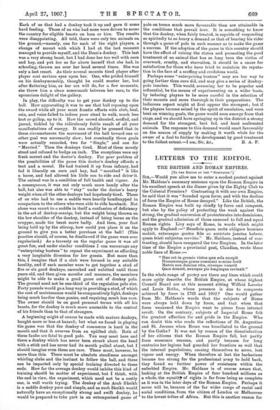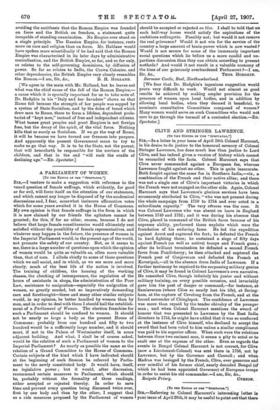LETTERS TO TIT E EDITOR.
[To Tea Eorrox or Tam Srscmort...]
SIR,—Would you allow me to enter a modest protest against Mr. Haldane's summary sentence upon the Roman Empire in his excellent speech at the dinner given by the Eighty Club to the Colonial Premiers Contrasting it with our own Empire, he said that it was "founded upon force, and with the decline of force the Empire of Rome decayed." Like the British, the Roman Empire was built up chiefly by force and conquest, but also by the policy of protecting the weak against the strong, the gradual conversion of protectorates into dominions, and the gradual admission of those annexed to full and equal Roman rights. Livy says of Rome, in words which might apply to England :—" Beneficio quam meta obligare homines tualuit, exterasque gentes fide ac societate junctas babere, quam tristi subjectas servitio." Mr. Haldane, instead of con- trasting, should have compared the two Empires. In the later time of the Empire a provincial poet, Claudian, wrote these noble lines of Rome:- " Mee est in gremio victos qua Bola recepit lInmanumque genus communi nomine fovit Matris non doming rite, civesque vocavit Quos domuit, nexuque pin longinqua revinxit."
In the whole range of poetry are there any lines which could more aptly describe the British Empire, at whose highest Council Board are at this moment sitting Wilfrid Laurier and Louis Botha, whose presence is due to conquests achieved by force in 1763 and 1902? One would gather from Mr. Haldane's words that the subjects of ROme were always held down by force, and that when that force weakened the Empire went to pieces from internal revolt. On the contrary, subjects of Imperial Ronie felt the greatest affection for and pride in the Empire: Who can doubt this who reads the reflections of St. Augustine and St. Jerome when Rome was humiliated to the ground by the Goths ? It was not by reason of the dissatisfaction of her citizens that the Roman Empire fell, but partly from economic reasons, and partly because for long centuries her legions had guarded her frontiers so well that the internal populations, ceasing themselves to serve, lost vigour and energy. When therefore at last the barbarians became too strong for the professional army to hold back, they found no' further power of resistance within the enfeebled Empire. Mr. Haldane is of course aware that, looking at the British Empire of four hundred millions as a whole, the equalit', of rights is far from being as complete as it was in the later days of the Roman Empire. Perhaps it never will be, because of the far wider range of racial 'and social conditions, from the citizen of London or Melbourne to the lowest tribes of Africa. But this is another reason for
avoiding the antithesis that the Roman Empire was founded on force and the British on freedom, a statement quite incapable of standing examination. No Empire ever stood on a single principle. The Russian Empire, for instance, rests more on race and religion than on force. Mr. Haldane would have spoken more scientifically if he had said that the Roman Empire was characterised in its later days by administrative centralisation, and the British Empire, so far, and so far only, as relates to the self-governing dominions, by diffusion of power. So far as relates to India, the Crown Colonies, and other dependencies, the British Empire very closely resembles [We agree in the main with Mr. Holland, but he leaves out what was the chief cause of the fall of the Roman Empire,— a cause which it is specially important for us to take note of. Dr. Hodgkin in his "Italy and her Invaders" shows us that Rome fell because the strength of her people was sapped by a system of State Socialism, and by the doles of bread which drew men to Rome, there to form a lifeless, dependent prole- tariat of "kept men," instead of free and independent citizens. What tames great peoples and great Empires is not foreign foes, but the decay of the spirit, of the vital force. Nothing kills that so surely as Socialism. If we go the way of Rome, it will be because we have turned our freemen into paupers. And apparently the present Government mean to try to make us go that way. It is to be the State, not the parent, that will henceforth be responsible for the nurture of the children, and that in the end "will rock the cradle of declining age."—En. Spectator.]



























































 Previous page
Previous page